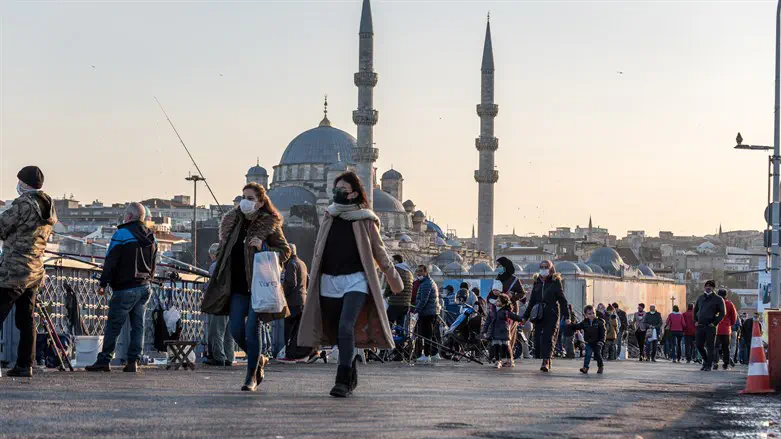
Amine Ayoub, a Middle East Forum fellow, is a policy analyst and writer based in Morocco.
For decades, Western foreign ministries have categorized Turkey under their Europe desks, clinging to an outdated vision of a NATO ally and a democratic bridge to the Middle East. That illusion must end. Under Recep Tayyip Erdoğan, Turkey has shed its secular foundations, embraced Islamist politics, and adopted the authoritarian playbook of Middle Eastern strongmen. Yet, despite its aggressive foreign policy, Islamist ties, and military adventurism, Western governments continue treating Turkey as a European partner rather than what it truly is: a Middle Eastern power with destabilizing ambitions.
For nearly a century, Turkey was a rare secular state in the Muslim world. Founded by Mustafa Kemal Atatürk, the Turkish Republic kept religion at arm’s length, embracing Western-style governance, education, and law. That era is over. Erdoğan has spent the last two decades dismantling secularism, replacing it with an Islamist-nationalist ideology that resembles regimes in Iran and Qatar far more than any European democracy.
The transformation has been deliberate and aggressive. Schools now emphasize Islamic teachings over secular education, imams wield more influence than academics, and dissenters who question this shift face persecution. In 2020, Erdoğan turned the Hagia Sophia—a symbol of Turkey’s secular identity—back into a mosque, an act that wasn’t just about religion but a declaration that the country was officially departing from its secular roots. This was not a European nation making a religious gesture; it was a Middle Eastern strongman using Islam as a tool of power.
Turkey’s alignment with political Islam is also evident in its foreign policy. It has actively supported Islamist movements across the Middle East, providing political and financial backing to groups like the Muslim Brotherhood and Hamas. In the West, these groups are recognized as threats to stability, yet Turkey actively nurtures them, offering them safe havens and diplomatic legitimacy. If Turkey were truly a European power, it would be countering Islamist extremism—not exporting it.
For years, Turkey was seen as a “problematic democracy,” but that phrase no longer applies. It is an authoritarian state in all but name, ruled by a leader who has rigged elections, silenced opposition, and jailed thousands of political dissidents. Western diplomats still talk about Turkey as a democracy in distress, but they are deluding themselves. A country that arrests journalists, censors the internet, and jails political opponents is not a democracy—it’s a dictatorship.
If Western governments are serious about defending democratic values, they must stop pretending that Turkey belongs in their club. It belongs alongside the Middle Eastern regimes that rule through repression and fear, not alongside European nations that value free speech and fair elections.
While Western diplomats still hope for Turkey to be a stabilizing force, its actions tell a different story. Rather than acting as a bridge between the West and the Middle East, Turkey has become a primary source of regional instability.
In Syria, Turkey has backed Islamist militias, facilitated the movement of jihadist fighters, and launched military incursions that have displaced thousands. It claims to fight terrorism, yet it has attacked the very Kurdish forces that helped the West defeat ISIS. Turkey’s military operations in northern Syria have made it clear that its priority is not counterterrorism but territorial expansion and ethnic cleansing.
In Libya, Turkey has fueled conflict by sending Syrian mercenaries to fight for Islamist factions. While Western nations pushed for diplomatic solutions, Turkey chose escalation, directly intervening with drones and troops.
Even in the Caucasus, Turkey has sought to exert influence through military intervention. During the 2020 Nagorno-Karabakh conflict, it provided direct support to Azerbaijan against Armenia, sending weapons, intelligence, and foreign fighters. Its involvement turned what could have been a contained conflict into a full-scale war.
Everywhere Turkey moves, chaos follows. This is not the behavior of a responsible European power—it is the playbook of a Middle Eastern actor seeking to expand its influence through conflict.
If Turkey were truly a European power, its closest allies would be European states. Instead, it has deepened ties with Middle Eastern authoritarian regimes and adversaries of the West.
Its relationship with Iran has grown stronger in recent years, with the two countries cooperating on military and intelligence matters. While the West imposes sanctions on Iran, Turkey helps it evade them, facilitating illicit oil and gold trade. Turkey’s willingness to partner with a regime that openly funds terrorism should set off alarm bells—but Western governments remain in denial.
Turkey’s close ties with Qatar further expose its regional identity. The two nations share an Islamist ideological bond, with both funding and supporting Muslim Brotherhood-affiliated groups. When Saudi Arabia and the UAE cut ties with Qatar over its links to extremism, Turkey immediately sent military reinforcements, choosing to align itself with the region’s most notorious funder of radical Islamism.
Even its dealings with Russia have raised serious questions. As a NATO member, Turkey should be opposing Russian military expansion, yet it purchased Russian S-400 missile defense systems in direct defiance of Western sanctions. This move was not just a military decision—it was a geopolitical statement that Turkey no longer sees itself as bound to Western security structures.
Western foreign ministries must stop treating Turkey as a troubled European state and recognize it for what it has become: a Middle Eastern actor driven by authoritarianism, Islamism, and regional power ambitions. Keeping Turkey under European desks allows policymakers to maintain the illusion that it can be brought back into the fold. But the truth is, Erdoğan has no intention of realigning with Europe. His Turkey is an aggressive, ideological force that sees itself as a leader of the Islamic world, not a partner of the West.
Reclassifying Turkey under Middle Eastern desks would not just be a bureaucratic adjustment—it would be an essential step toward dealing with Ankara as the strategic threat that it is. It would allow Western governments to craft policies that acknowledge the reality of Turkey’s ambitions, rather than clinging to outdated diplomatic frameworks.
